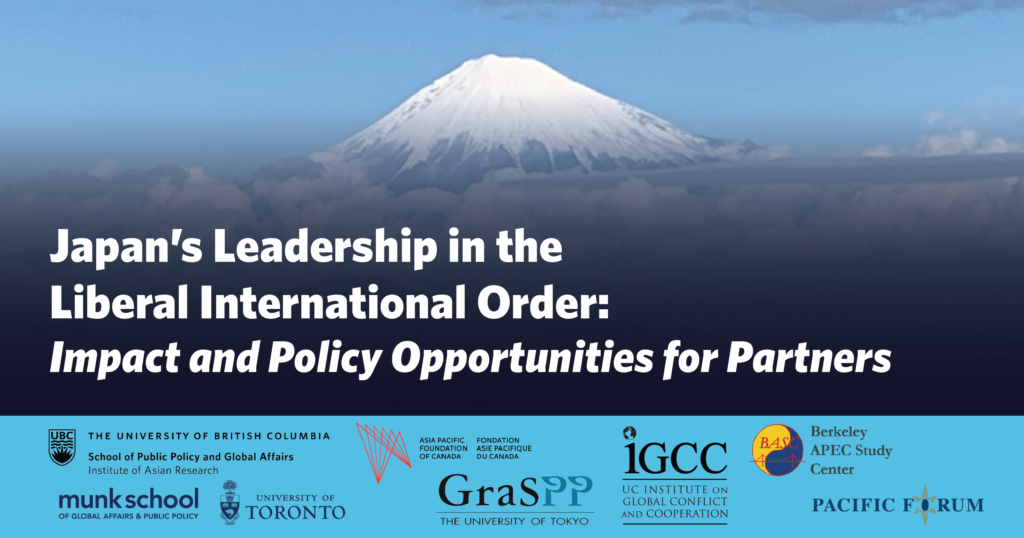
I’m pleased to announce that my paper “Crafting Policy for Contested Commons: Insights from Japan’s Approach to the Outer Space, Cyberspace, and Maritime Domains” has been published as part of a joint policy paper series entitled “Japan’s Leadership in the Liberal International Order: Impact and Policy Opportunities for Partners.”
My paper examines Japan’s changing approach to the global commons, tracking commonalities across the outer space, cyberspace, and maritime domains. As security threats have emerged in these domains, Japan has continued to uphold the principles of the liberal international order based on rule of law, but it has also hedged against risk by securitizing issues, by turning its existing diplomatic and technological tools to new purposes, and by linking the commons with security structures related to the Japan Self-Defense Forces and the U.S.-Japan alliance. This examination of Japan’s approach to the global commons has broad implications for policy. First, there is a clear need for serious attention to the maintenance and/or construction of governance regimes that will promote the use of the global commons in ways that benefit all countries. Second, the increasingly crowded and competitive environment in the global commons presents new challenges in terms of cultivating consensus and regulating activity, but it also offers opportunities to create coalitions of like-minded countries, and middle powers have an important role to play in this process. Third, the clear parallels in changes across the outer space, cyberspace, and maritime domains suggest that there is something valuable to be gained from fostering dialogue among their respective scholars and practitioners, to find best practices that can be shared or transferred across domains. Although the onset of COVID-19 has drawn the attention of many countries away from developments outside their national borders, it has not lessened the importance of these issues—indeed, there is evidence that the global pandemic may be providing a convenient distraction that is enabling additional incursions in these domains and further eroding norms regarding their shared use.
The paper series as a whole examines Japan’s remarkable leadership on various dimensions of global and regional economic governance, including trade governance, economic and data governance, regional rules-based order, and environmental governance, asking: How significant is this new phase of Japanese international leadership in historical perspective? What factors are driving this new global leadership? What are implications for Japan’s partners, including Canada, and the US?
The series also features pieces by Vinod Aggarwal (University of California, Berkeley), Alan Alexandroff (University of Toronto), Leslie Elliott Armijo (Simon Fraser University), Joseph Caron (University of British Columbia), Grace Jaramillo (Asia Pacific Foundation of Canada), Saori Katada (University of Southern California), Masahiro Kawai (University of Tokyo), Phillip Lipscy (University of Toronto), Jeffrey Kucharski (Royal Roads University), Harutaka Takenaka (National Graduate Institute for Policy Studies), T.J. Pempel (University of California, Berkeley), Sayuri Romei (Wilson Center), Mireya Solis (Brookings Institution), Hiroki Takeuchi (Southern Methodist University), and Yves Tiberghien (University of British Columbia).
The series was jointly published by:
- Centre for Japanese Research, Institute of Asian Research School of Public Policy and Global Affairs, University of British Columbia
- Centre for the Study of Global Japan and Global Summitry Project, Munk School of Global Affairs and Public Policy, University of Toronto
- Asia Pacific Foundation of Canada
- Graduate School of Public Policy, University of Tokyo
- Pacific Forum
- Berkeley APEC Study Center, University of California, Berkeley
- Institute on Global Conflict and Cooperation, University of California, San Diego
My thanks go to the University of British Columbia and the Asia Pacific Foundation of Canada for providing the support for me to attend the conference for which these papers were initially written, which was held at the University of British Columbia in January 2020. This UBC conference was held back-to-back with the Asia Pacific Foundation of Canada’s conference on “The Free and Open Indo-Pacific: Charting A Common Approach,” where I also gave a talk on “Designing Trade Architecture for the Free and Open Indo-Pacific.” This back-to-back structure allowed many participants to engage in both events, resulting in much productive dialogue between academics and policymakers.
